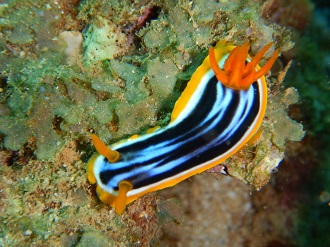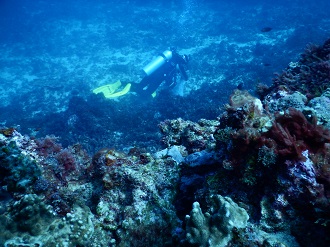About the department:
The University of Aberdeen has a vibrant biology department with several recent hires in ecology and evolution along with an outstanding PhD community. We’re located on the North Sea in Scotland, known for its extensive sand dunes and rocky cliffs, and we don’t shy away from a polar dip in the winter!
About the research:
Broadly speaking, the goal of my research is to better understand diversity in aquatic ecosystems, with a focus on hyperdiverse marine invertebrates. This involves using field and museum collections, genomic tools and modelling to resolve phylogenetic relationships and population structure, to identify genomic regions of speciation and adaptation, and to make predictions about how biodiversity will respond to climate change in the future. I’m especially interested in the evolution of warning colouration and mimicry in nudibranchs, and the genomic basis of colour more broadly, as well as improving genomic resources for understudied invertebrates.
What has been the biggest challenge as a new PI so far?
I don't want to sound like a broken record so I'll keep this short and sweet—juggling a pandemic, trans-Atlantic move, and maternity leave in the first 18 months of my position was quite the challenge!
How have you prepared to be a PI?
I was lucky to have independence as a PhD student and postdoc (and even as an MSc student!) and this helped me to think critically and ask interesting questions. When I was transitioning between PhD and postdoc I went to my mentor to ask for advice (having a mentor in the field is incredibly helpful, by the way!) and they described the role of a PI as putting out a series of fires on a daily basis and it being important to know which fires to extinguish first. As simple as this sounds, this was one of the most important pieces of advice I received along the way. This helped me to learn how to prioritise and not to 'sweat the small stuff', so to speak.
When was your first Evolution Meeting, and how did it affect your career?
My first Evolution meeting was the joint congress in Montpellier in 2018 and it was instrumental to my career—it's where I met my future postdoc supervisor. It was a great opportunity to discuss my research with such an impressive group of scientists, and the banquet at Abbaye de Valmagne was sensational! I was also particularly grateful to receive travel support from SSE—it otherwise wouldn't have been possible coming from Western Australia.
Do you teach evolution? What concept blows students’ minds?
I teach evolutionary concepts as part of my combined undergraduate and master's course in marine biodiversity. Although not a concept per se, I find that students are constantly surprised by how natural history collections serve as such important resources for understanding evolutionary biology. I think more can be done to better communicate their importance to the younger generation.
Do you have a time management tip to share?
Two things I try to do: 1) set weekly goals so I can make sure that projects keep ticking along and 2) prioritise properly to avoid spending a disproportionate amount of time on a relatively unimportant task. Do I always take my own advice? Sadly, no.
What book should every evolutionary biologist read?
I'm enjoying Extended Heredity at the moment!
What one piece of advice would you give to a starting graduate student?
Write often! And don't be afraid to get feedback on an early (and very rough) draft—it may save you a lot of work in the end.
Do you remember making any mistakes as a trainee; how did you recover?
Yes. At the beginning of my PhD I received specimens from a museum and I was very eager to get into the lab and start processing them. I didn't check the inventory list well enough and hadn't realised that some specimens were meant for someone else and not for molecular work. Unfortunately, I had already processed them in the lab and there was no tissue remaining. These organisms were incredibly difficult to collect and probably impossible to replace (I'm forever apologising Nerida and Greg). I learned some valuable lessons- don't be hasty and triple check inventory lists.
What do you enjoy doing in your free time?
My free time has changed lately since I have a 5-month-old at home. What was hiking, venturing to craft breweries and yoga has transformed into baby massage, swimming lessons, and leisurely strolls (but I'm hoping to get back to those other hobbies in the not-so-distant future).
.jpg) Kara Layton
Kara Layton
